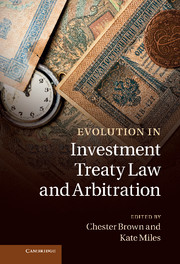Book contents
- Frontmatter
- Contents
- Contributors
- Editors' preface and acknowledgements
- Table of cases
- Table of Treaties
- Part I Introduction
- Part II Shifts in fundamental character
- 2 Conflict and conflicts in investment treaty arbitration: Ethical standards for counsel
- 3 Recent developments in the approach to identifying an ‘investment’ pursuant to Article 25(1) of the ICSID Convention
- 4 Investment treaty interpretation and customary investment law: Preliminary remarks
- 5 The public–private dualities of international investment law and arbitration
- 6 Outline of a normative framework for evaluating interpretations of investment treaty protections
- 7 Investment treaty arbitration as global administrative law: What this might mean in practice
- Part III Actors in international investment law
- Part IV The new significance of procedure
- Part V Engagement with cross-cutting issues
- Part VI Conclusions
- Index
- References
6 - Outline of a normative framework for evaluating interpretations of investment treaty protections
from Part II - Shifts in fundamental character
Published online by Cambridge University Press: 05 December 2011
- Frontmatter
- Contents
- Contributors
- Editors' preface and acknowledgements
- Table of cases
- Table of Treaties
- Part I Introduction
- Part II Shifts in fundamental character
- 2 Conflict and conflicts in investment treaty arbitration: Ethical standards for counsel
- 3 Recent developments in the approach to identifying an ‘investment’ pursuant to Article 25(1) of the ICSID Convention
- 4 Investment treaty interpretation and customary investment law: Preliminary remarks
- 5 The public–private dualities of international investment law and arbitration
- 6 Outline of a normative framework for evaluating interpretations of investment treaty protections
- 7 Investment treaty arbitration as global administrative law: What this might mean in practice
- Part III Actors in international investment law
- Part IV The new significance of procedure
- Part V Engagement with cross-cutting issues
- Part VI Conclusions
- Index
- References
Summary
Introduction
There are at least two ways in which legal scholarship might be approached. One might ask what the law on a particular subject is. This question invites doctrinal inquiry through an examination of authoritative sources internal to a legal system. Alternately, one might ask whether the law on a particular subject matter is desirable or just. This normative inquiry typically begins with a characterisation of what the law on a given subject is, but its primary objective is the evaluation of law by external, normative criteria.
Arbitral tribunals charged with interpreting and applying international investment treaties (IITs) continue to grapple with legal concepts such as ‘fair and equitable treatment’ and ‘indirect expropriation’. Different tribunals have interpreted common treaty language in distinct ways; for example, in an earlier work I argue that tribunals have used six, identifiably distinct approaches to distinguish indirect expropriation from legitimate non-compensable regulation. It would be useful to be able to examine which interpretations were more desirable – in a normative sense – and which were inadvisable. This chapter presents a framework for normative evaluation of interpretations of the substantive protections of foreign investment contained in IITs.
- Type
- Chapter
- Information
- Evolution in Investment Treaty Law and Arbitration , pp. 117 - 144Publisher: Cambridge University PressPrint publication year: 2011
References
- 2
- Cited by



